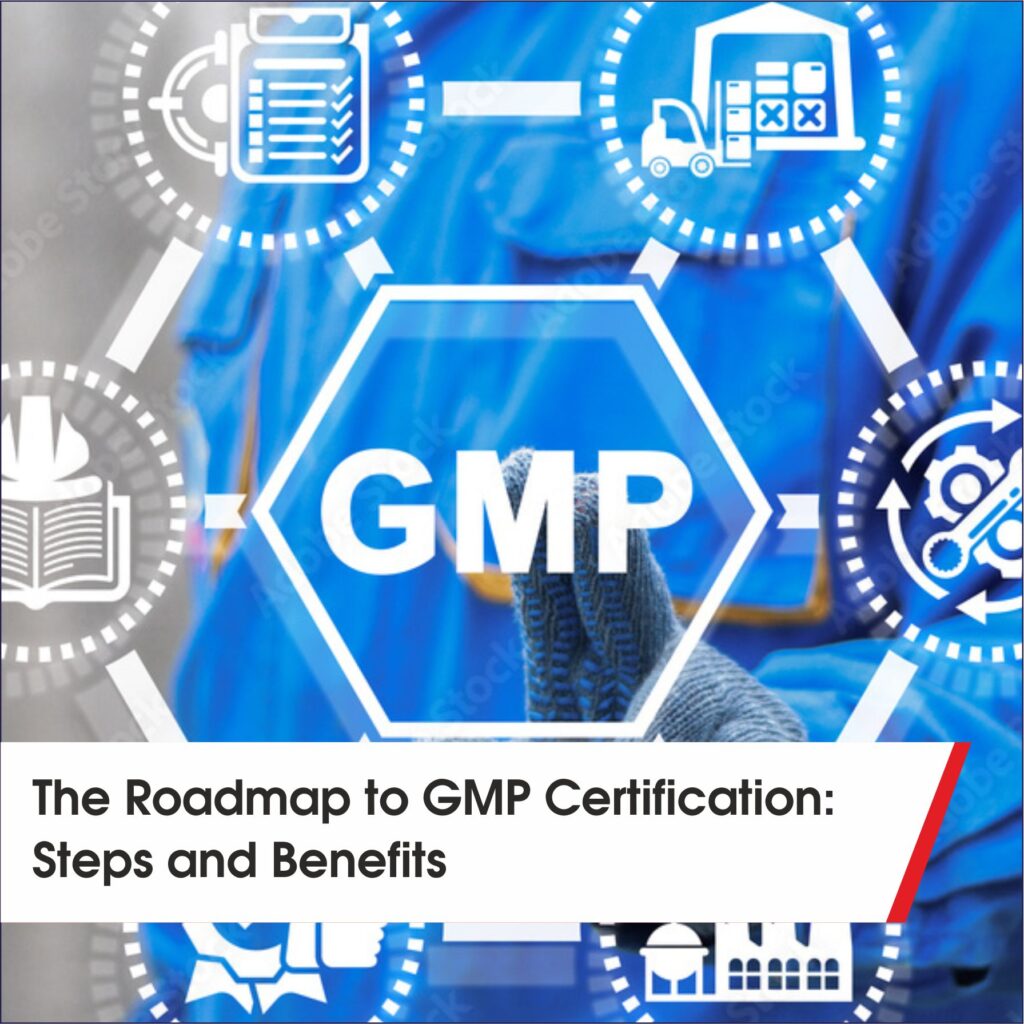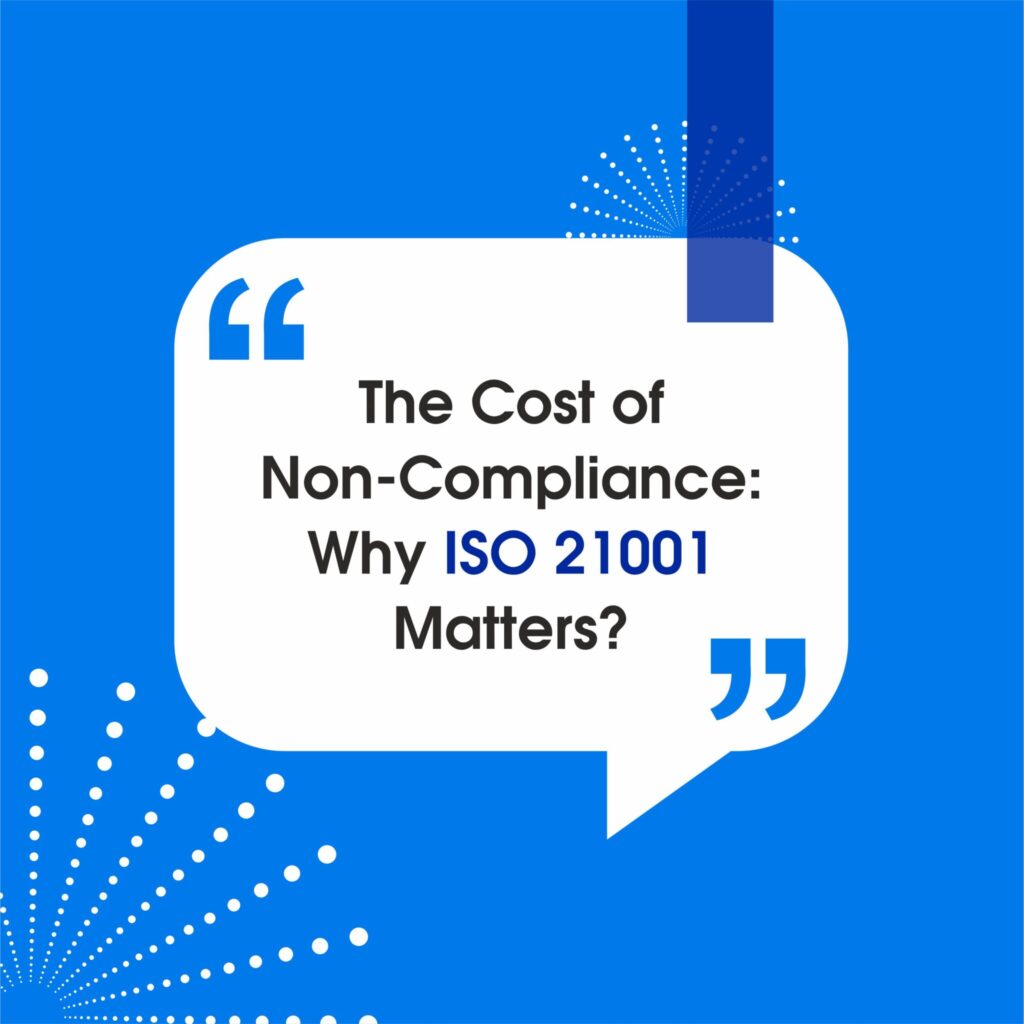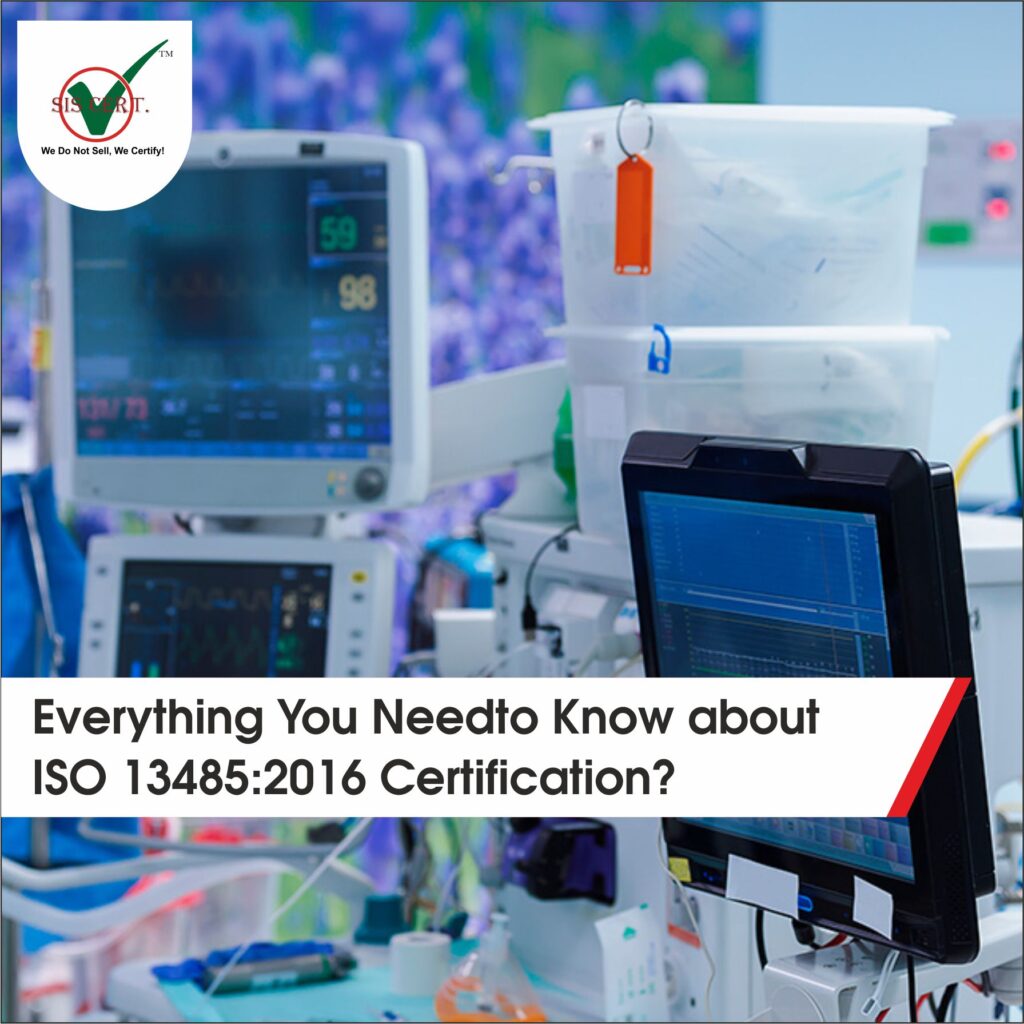The Roadmap to GMP Certification: Steps and Benefits

Good Manufacturing Practices (GMP) accreditation has emerged as a critical benchmark for guaranteeing product safety, quality, and compliance in today’s highly regulated and quality-driven sectors. Organisations can outline the road plan to attain GMP certification and maintain high manufacturing standards. This article outlines the essential procedures for acquiring GMP certification and outlines the many advantages it provides to organisations. What is Good Manufacturing Practices (GMP)? Good Manufacturing Practices (GMP) is a quality management system that outlines the minimum requirements for manufacturing, packaging, labelling, and testing products. The guidelines ensure the consistent quality, safety, and efficacy of products manufactured in regulated industries. These guidelines are established and enforced by regulatory agencies such as the Food and Drug Administration (FDA) in the United States and the European Medicines Agency (EMA) in Europe. GMP certification is essential for businesses operating in various industries, including pharmaceuticals, food and beverages, cosmetics, and medical devices. A Step-by-Step Guide to Achieve GMP Certification ⮯ Achieving a Good Manufacturing Practices (GMP) certificate is a rigorous process. Moreover, organisations can follow these steps to obtain a GMP certification :- Assessing Current Practises: The initial step requires conducting an internal assessment to monitor and measure production and quality control procedures. Moreover, to satisfy GMP requirements, organisations shall assess operations records, employee training, and facilities to determine improvement areas. Providing Training: Employees at all levels must get training on GMP practices and principles to comply with GMP criteria. Everyone must comprehend the significance of compliance and adhere to the established norms in this training. Documentation: A crucial component of GMP compliance is thorough and organised documentation. Moreover, this entails producing batch records, quality manuals, standard operating procedures (SOPs), and others. Facilities Design and Maintenance: Facilities must be designed and maintained in accordance with GMP standards to achieve intended manufacturing outcomes. Furthermore, it ensures GMP compliance with international best practices. Testing and Quality Control: Adhering to GMP regulations requires having effective testing and quality control procedures. Companies must follow quality control labs to test raw materials, samples taken during production, and completed goods to ensure they adhere to predetermined standards. Supplier Qualification: Organisations should assess and qualify their suppliers to ensure they follow GMP guidelines. Moreover, audits and evaluations of the facilities and operations of suppliers are necessary to ensure compliance. Auditing and Inspection: Organisations must evaluate their compliance with GMP guidelines defined by regulatory bodies. Moreover, they shall conduct frequent audits and inspections to detect and address potential threats and opportunities. Corrective and Preventive Activities (CAPA): It’s critical to take corrective and preventive action to eliminate non-compliance issues. Investigating the underlying causes of the problems and putting preventative measures in place are necessary. Application for GMP Certification: Once a business is confident that it has complied with all GMP regulations, it may apply for GMP certification to the appropriate regulatory body. This application comes with thorough supporting materials and proof of compliance. Continuous Improvement: GMP certification is a lifelong commitment rather than a one-time accomplishment. Moreover, businesses must regularly review and enhance their systems and processes to maintain GMP compliance. Benefits of GMP Certification for Organisations GMP certificate offers a goldmine of benefits to organisations. Moreover, an organisation can avail of the following benefits by implementing Good Manufacturing Practices (GMP) Certification :- – GMP certification proves a business’s dedication to abiding by stringent regulatory requirements. As a result, there is less chance of regulatory measures like penalties or product recalls. – GMP principles provide a robust structure and focus on establishing efficient and controlled production processes, which can result in cost savings. – GMP certification is a widely accepted standard worldwide that assures good quality and safety of products. However, GMP-accredited businesses can more readily access international markets and participate in global competition. – GMP certification verifies that products are fit for consumption, lowering the possibility of adverse consumer events or health-related problems. – GMP accreditation is a powerful marketing tool that can draw clients and business partners, giving certified organisations an advantage over their rivals. Conclusion ✅ It takes dedication to excellence in manufacturing practices to earn GMP accreditation. The path to GMP certification requires thorough planning, education, record-keeping, and regular compliance monitoring. Moreover, obtaining GMP ISO certification is a wise investment for businesses functioning in regulated industries. Enjoy Reading – Know About ISO 37001 Standard ISO 37001: Anti-Bribery Management System-Benefits and Implementation Non-Conformity and Corrective Action Major/Minor Non-Conformances : Explored in Detail
The Cost of Non-Compliance: Why ISO 21001 Matters?

ISO 21001:2018 certification is a globally recognised standard that signifies an educational organisation’s commitment to delivering high-quality education services. It focuses on establishing an effective Educational Organisation Management System (EOMS) that ensures the fulfilment of educational objectives, student satisfaction, and continuous improvement. The certification involves a rigorous audit by an accredited ISO certification body to assess compliance with ISO 21001 requirements. Achieving ISO 21001 certification demonstrates an institution’s dedication to providing excellence in education, enhancing stakeholder satisfaction, and fostering a culture of continual improvement in educational processes and outcomes. What could be the possible ISO 21001:2018 standard? ISO 21001 is a standard that helps educational organisations improve their educational management systems. Non-conformities in ISO 21001 refer to instances where an organisation’s practices or processes do not meet the requirements and criteria outlined in the standard. Here is a list of possible ISO 21001:2018 non-conformities: Inadequate Documentation Undefined Educational Objectives Lack of Stakeholder Engagement Inefficient Resource Allocation Non-compliance with Regulatory Requirements Inadequate Curriculum Design Insufficient Feedback Mechanisms Inadequate Corrective Actions Incomplete Training and Development Resource Shortages Data Security and Privacy Ineffective Internal Auditing Failure to Monitor and Measure Inadequate Continual Improvement Lack of Leadership Commitment Inadequate Communication Resource Constraints Student Complaints Non-compliant Faculty Practices Lack of Faculty Training The Consequences of Non-Compliance with ISO 21001 ⮯ Non-compliance with ISO 21001 can have several adverse consequences for educational organisations. These consequences go beyond monetary penalties and can significantly impact an institution’s reputation, credibility, and long-term sustainability. Diminished Educational Quality – Failure to implement ISO 21001:2018 certification may result in a lack of standardisation in educational processes, leading to inconsistencies in curriculum delivery and assessment. Moreover, this can ultimately compromise the quality of education and negatively affect students’ learning experiences and outcomes. Decreased Stakeholder Trust – Stakeholders, including students and parents, trust educational institutions to provide quality education. Non-compliance with ISO 21001 can erode this trust, leading to a decline in enrolment and loss of revenue. Negative word-of-mouth and publicity can further damage an institution’s reputation. Inefficient Resource Utilisation – Without a strong management structure, institutions might have trouble allocating resources effectively. It may lead to a waste of resources, including academic time and money. The ability of an institution to invest in faculty development, infrastructure enhancements, and other crucial changes can be hampered by ineffective resource management. Legal and Regulatory Consequences – ISO 21001-certified educational institutions follow various national and international laws and regulations. It helps them avoid legal implications, fines, and even actions against the institution’s management that may result from noncompliance. Additionally, this may take time and resources away from important instructional tasks. Competitive Disadvantage – ISO 21001 certification is increasingly becoming a differentiator in the education sector. Institutions that have obtained ISO 21001 certification can use it as a marketing tool to attract students and gain a competitive advantage. Non-compliant institutions may find it challenging to compete effectively in the market. Conclusion ✅ ISO 21001:2018 certification is significant for educational organizations, representing their commitment to excellence in education delivery and management. Compliance with this global standard ensures the fulfilment of educational objectives, student satisfaction, and a continuous drive for improvement. It is crucial to address and rectify possible non-conformities in ISO 21001, such as inadequate documentation, undefined educational objectives, and insufficient stakeholder engagement, to maintain the integrity of the educational management system. Enjoy Reading – Non-Conformity and Corrective Action Major/Minor Non-Conformances : Explored in Detail Non-Conformity Blog On ISO 9001:2015
Everything You Need to Know about ISO 13485:2016 Certification?

ISO 13485:2016 is a golden standard for Medical Devices – Quality Management Systems (MDQMS). The certification recognized the need and requirement for business organizations to deliver safe and quality medical devices. The last version of the certification is ISO 13485:2016 certification. Definition of ISO 13485:2016 Certification ISO 13485 standard is for medical device quality management based on the ISO 9001 requirements. The certification focuses on designing a more coordinated medical device regulatory policy to monitor and measure the effectiveness of products. The standard provides specific guidelines for medical device manufacturers to ensure the well-being and safety of end users. ISO 13485 standard is a Quality Management System specifically designed for medical devices. Moreover, the certification includes: – Formulating an adequate Medical Devices – Quality Management System (MDQMS) policy. Follows a Risk Management Approach for product development and product realization Defining the scope of business processes It maintains compliance with statutory and regulatory requirements Effective product traceability and recall systems Benefits of Implementing ISO 13485 Certification for an Organization ⮯ ISO 13485 offers a goldmine of benefits for the medical device industry. Moreover, the organizations can reap the benefits only after the successful implementation of the ISO 13485 certification. The benefits of the standard are as follows:- It creates a positive image of a company – The ISO 13485 certification is a globally recognized standard for quality management, specifically for medical devices within the healthcare sector. The standard is a hallmark of trust and credibility; hence, it creates a positive image of an organization in the market. Promotes evidence-based decision-making – The certification demonstrates the responsible behavior of the organization by adhering to rigorous quality standards. It provides a robust framework for organizations to maintain quality standards by studying previous data and information. Moreover, it follows an adequate data management strategy to achieve organizational goals and objectives. Establishes a culture of continuous improvement – ISO 13485 standard follows the principle of continuous improvement to achieve the intended quality goals and objectives. The Medical Devices – Quality Management System (MDQMS) integrates within the existing management system to foster a culture of continuous improvement. Increases employee engagement – ISO 13485:2016 standard aims to document all the business operations and process control to monitor the effectiveness of the certification. Moreover, it focuses on rendering a clearer understanding of their roles to employees and increasing productivity. Requirements of ISO 13485:2016 Certification ⮯ The requirements of ISO 13485 standard are as follows: SECTION 1: SCOPESECTION 2: NORMATIVE REFERENCESSECTION 3: TERMS AND DEFINITIONSECTION 4: QUALITY MANAGEMENT SYSTEM General Requirements Documentation Requirements SECTION 5: MANAGEMENT RESPONSIBILITY Management Commitment Customer Focus Quality Policy Planning Responsibility, Authority, and Communication Management Review SECTION 6: RESOURCE MANAGEMENT Provision of Resources Human Resources Infrastructure Work Environment and Contamination Control SECTION 7: PRODUCT REALIZATION Planning of Product Realization Design and Development Customer-Related Process Purchasing Product and Service Provision Control of Monitoring and Measuring SECTION 8: MEASUREMENT, ANALYSIS AND IMPROVEMENT Internal Audits Control of Non-Conforming Product Analysis of Data Improvement Conclusion ✅ ISO 13485:2016 certification aims to consistently provide safe and high-quality medical devices to fulfill customers’ needs and requirements. However, it measures compliance with the regulations and technical requirements to demonstrate an organization’s commitment to delivering effective and quality medical devices.
